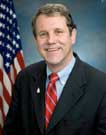|

|
The views expressed on this page are soley
those of the author and do not
necessarily represent the views of County
News Online
|
 |
U.S. Senator Sherrod Brown
Fighting for
Ohio Steel and Ohio Jobs
For generations, the steel industry has provided Ohio families with
good-paying jobs. Steel is in the cars we drive and the bridges we
drive on. It is a major part of our economy and our national defense.
But the steel industry is facing a crisis. A flood of cheap imports
from countries like China is crippling the industry. And families and
communities who rely on a robust steel sector are suffering the
consequences.
This week, U.S. Senator Sherrod Brown testified before the U.S. Trade
Representative (USTR). In his testimony, Sen. Brown outlined
administrative actions the U.S. can take to rebuild the domestic steel
industry and fight back against foreign competitors who cheat the
system.
Sen. Brown called on the Administration to fully implement his
legislation, the Leveling the Playing Field Act. This bill was signed
into law last year and gives U.S. companies greater tools to fight back
against trade cheats. If not fully implemented, however, it cannot
provide all necessary options to ensure a fair marketplace for domestic
manufacturers.
Sen. Brown also called on the Administration to renegotiate the
Trans-Pacific Partnership’s (TPP) “auto rules of origin.” These are the
requirements within a trade agreement that define what constitutes a
“domestically made” car. If a car is “made” in a TPP country, it
receives lower tariffs as part of the deal.
But under these complex rules, the car doesn’t need to be produced in a
country to be considered “made” domestically. Under the North American
Free Trade Agreement (NAFTA), only 62.5 percent of a vehicle needs to
be made in a NAFTA country to earn trade benefits. And the threshold
for TPP’s auto rules of origin is even lower.
Under TPP’s current language, 45 percent of a vehicle needs to be
produced in a TPP county. For example, China can manufacture 55 percent
(while not adhering to any other TPP rules), ship the car to Japan for
the other 45 percent, and it still enters the U.S. market at lower
tariff rates. This is a loophole so big you could drive a Jeep Cherokee
through it — and it’s why Sen. Brown called on the USTR to change this.
Finally, Sen. Brown called on the Administration to take concrete
actions against China. He urged representatives to file a case against
China at the World Trade Organization in order to stop Chinese
companies from flooding and distorting the U.S. steel market. He also
asked the U.S. Department of Commerce to maintain China’s non-market
economy status, which is up for review at the end of 2016. China simply
does not meet the definition of a market economy and should not be
treated as one.
These actions, taken together, are necessary to help solve this crisis.
While addressing the unfair threats facing the steel industry will not
be easy, Sen. Brown believes that with continuous and dedicated action,
U.S. policymakers can bring relief to this critical sector and the many
working families it employs.
|
|
|
|

